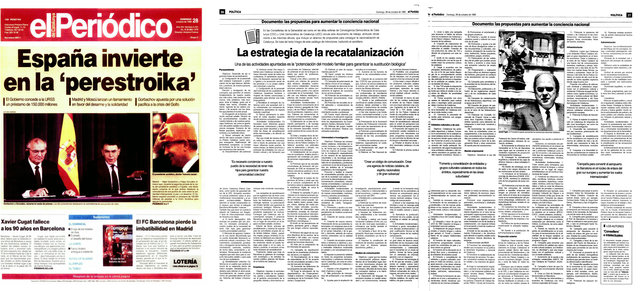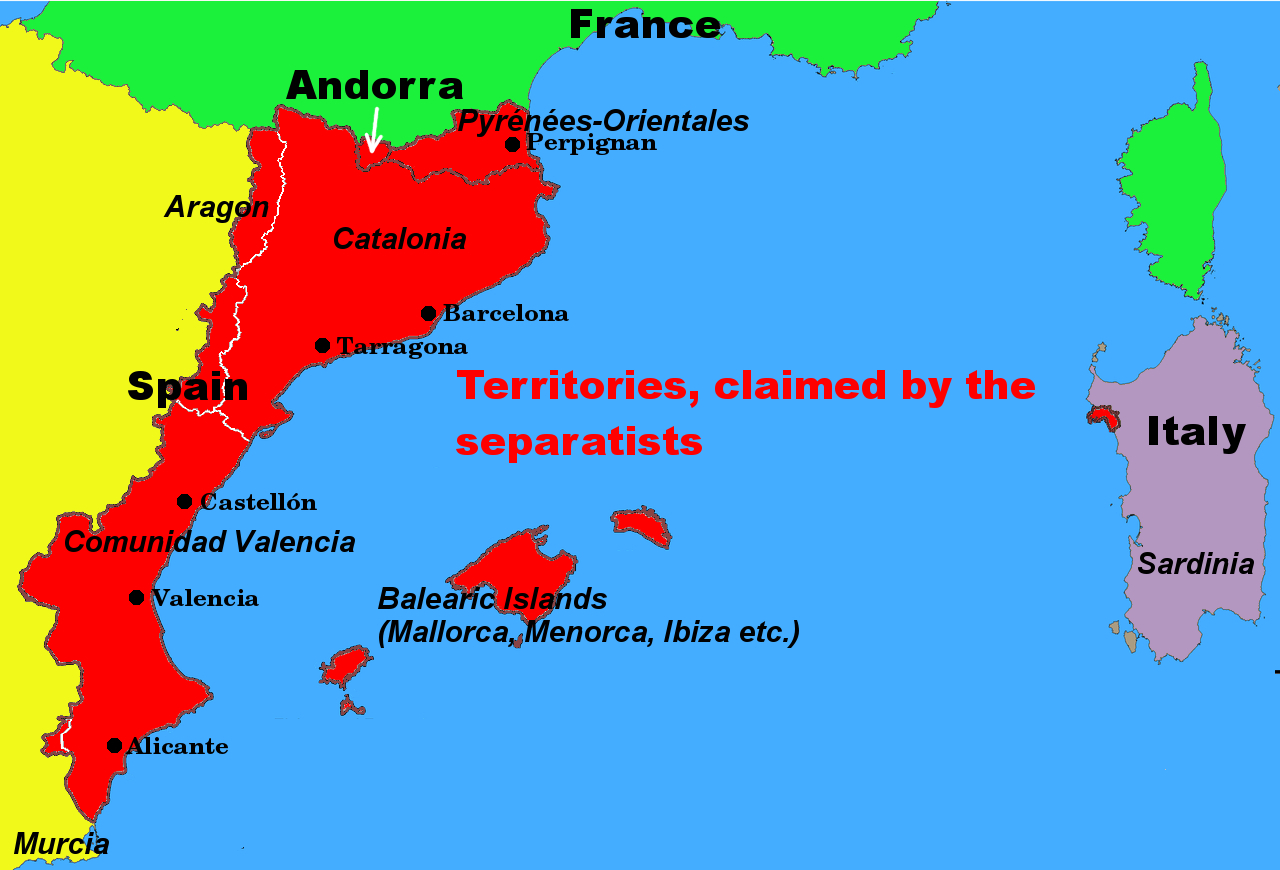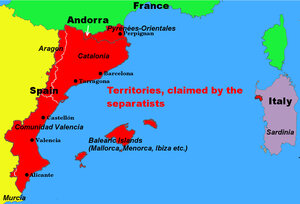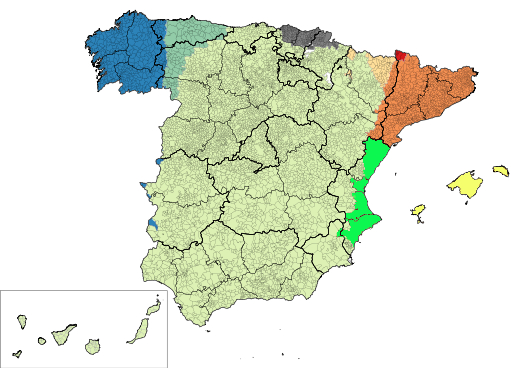Follow the money!
Catalan or Valenciano?
Influence of Catalan NGOs on Valenciano
March 27, 2025
Donald Trump's cut-off of funds for USAID1 drew the attention of many to the fraudulent labelling of NGOs, i.e. non-governmental organisations and governmental organisations alike.
Shortly afterwards, this fraud became very clear once again, especially to Germans, through a CDU (conservatives) enquiry, the so-called 551 questions to the Federal Government.
Reason enough to take another look at the Catalan governmental and non-governmental organisations and seek an answer to the question of what is so special about them.
The 'AID' in USAID does not mean 'aid' as one might mistakenly assume, but for Agency for Industrial Development. To make the deception work, it is estimated that only „around 10-15% of USAID's annual budget goes directly to emergency relief and humanitarian programmes,“ summarises the AI chatgpt.com. The enormous remainder goes mainly to media (such as radio, TV and newspapers) as well as political parties, NGOs, etc., so that they can act to the benefit of American foreign policy and interests. Prominent examples include the globally active and important news agency Reuters and the English BBC Media Action. To ensure that the propaganda is all-encompassing, even the youngest children are indoctrinated, for example by influencing the producers of school textbooks2 even in distant Kyrgyzstan.
Not much difference in Germany, where the conservativ party CDU (still the opposition party in March 2025) asked 551 questions about the funding of NGOs such as 'Grannies against the right'3, 'Correctiv'4 or the 'Amadeu Antonio Foundation'5, all disinformation agencies of a dubious nature. The CDU caused great indignation among the ruling parties and, in some cases, incomprehension within its own ranks. After all, not everyone needs to know how the dirty business with many NGOs works. In spring, the CDU will probably form the new government and could use NGOs themselves.
The Catalan government is funding propaganda in neighbouring regions within Spain and the central government seems powerless. A worldwide peculiarity, it seems to me.
Financial flows from Catalan NGOs
Anyone who is aware of how Catalan NGOs exert financial influence on the language in Valencia and separatist tendencies should skip to the next chapter.
In this chapter, I repeat some of the information on the financing of Valencian NGOs from Catalonia from my blog. My first articles dealt with this strange financing. I basically ask what the reasons are for the event, or for a particular individual/group to be the author of an event?. „Follow the money“ doesn't always help, as with any criminal case, but it usually helps to understand why an event happens or why an article is written.
My first three articles on funding can only be found in the overview for 2018, as I did not yet make individual articles accessible via hyperlinks. The first article deals with the financing of the Escola Valenciana, which at the time had been supported by the Catalan government with around 2 million euros since 2005.
For the two following articles, I refer below with the hyperlinks to the Spanish sources, which I had not done at the time. The three original English texts are, as I said, in the overview for 2018
* 21 October, 2018 Valencian taxpayers' money for an imperial Catalonia!
* 31 October, 2018 Even more taxpayers' money for separatists
In 2019, I quoted the online-magazine El Mundo as saying that more than half a million euros were spent by a Catalan NGO on the 19 spies whose task was to monitor the use of Catalan in school playgrounds.
In 2022, I recalled Tax money rains on separatists in Valencia and asked why the Acció Cultural del País Valencià (ACPV) receives funds from the Catalan Omnium Cultural. For its part, the newspaper ABC.es quoted the PP spokesperson as saying: „The President is alarmed by the growing Catalanist 'pro-paìsos' 6 offensive in the Valencian Community'“ and believes that „the constant aggression of Catalan independence supporters against this country, where a small minority acts as a Trojan horse for Catalanist expansionist imperialism, is intolerable“.
Recently, on 1 March 2025, „Hablamos Español“ pointed out a subsidy of 800,000 euros for Valencian institutions to „remove Spanish from education“ in an article titled „Does pan-Catalanism want to abolish Valencian?“. The payment flows cited there are based on data from the 'Gobierno de España, Base de Datos Nacional de Subvenciones'
ElMundo.es warned a few days ago:„'The Pancatalanists will ... not stop'“ and „...continue to spend their large subsidies on manipulating the population and regaining their lost political power.“
Catalan or Valenciano - A history of conflict
I know from my grandchildren that their school in Jávea (Valencia) teaches that there are four languages in Spain: Castellano (Spanish), Gallego, Basque and Catalan, and that Valenciano is a southern variant of Catalan. Time and again I read in newspapers how Valencian readers, intellectuals, writers and politicians are resisting attempts to Catalanise Valenciano. Friends of Valencian culture and language have repeatedly pointed out to me that Valenciano is not a dialect of Catalan. I am not a linguist and find this question very interesting, but not decisive for the purpose of this blog, which is to defend against the language imposition exercised by the Catalan separatists and their Valencian disciples.
Why deal with it anyway? The answer is: If there are justified doubts about this thesis, then these should also be mentioned in school. A one-sided teaching would be indoctrination. Dealing with this question helps to understand how deeply the successes of Catalanist propaganda and indoctrination affect the Spanish and non-Spanish public and oneself. Is it the influence exerted by the Catalan government and the Catalan NGOs it more or less pays for?
Below you will find two relatively easy-to-understand texts with opposing theses on this conflict history.
The first text reads: Cómo ha llegado a triunfar la mentira del independentismo catalán en Valencia. English translation: How the Catalan independence movement's lie has triumphed in Valencia. In the introduction to her essay, the author of the book „El nacionalismo valenciano“, Dr Josefa Villanueva Espinosa, clarifies her point of view.
„In Valencia, we have been hearing about the Catalan identity of the Valencian language for over a hundred years, whereas in previous centuries no one would have thought of making such a statement or initiating such a debate. The truth is that it was Catalan nationalism that triggered this controversy at the beginning of the 20th century (1902). Therefore, the question of Valencian Catalan identity is a purely political issue that has been deliberately disguised as a scientific debate in order to mislead people and, above all, to deprive Valencians of their right to their own language.“
Later she remarks: „Katalonien kopierte damit ein Phänomen, das in anderen Teilen Europas bereits auftrat: Sprache und Kultur wurden immer wieder als Vorwand für Grenzänderungen genutzt, selbst um den Preis, Kriege wie den Ersten und Zweiten Weltkrieg zu provozieren. Nehmen wir an, dass der Nationalismus von Natur aus zur Expansion neigt. Daher das Interesse der Katalanisten an der Ausweitung des katalanischen Territoriums auf die gesamte Region Valencia sowie die Balearen.“
The second text can be found on the website of the Institute for Romance Languages and Literatures at Goethe University in Frankfurt am Main and is titled Catalan Language. (Translation of the German text not possible due to author's rights, please use DeepL.com if needed.) This text is also easy to understand and, in contrast to the first text, sees the beginning of Catalan essentially as early as the 9th century and shows no political influence during the 20th century on tht language itself: „As far as the first written evidence of Catalan is concerned, Catalan words or, since the 11th century, whole sentences in Catalan appear as early as the 9th century and more frequently in the 10th century in some Latin texts that have survived to this day, which show that a form of Catalan not very far removed from today's language form was spoken.“
The first text recognises Catalan as an artificially and politically formed language, while the second text sees it as a natural development since the 9th century. Both texts substantiate their thesis with many examples, so what is the layman to believe? As a layperson, the abundance of data can be confusing. In addition, the second (Frankfurt) text does not address the underlying conflict at all.
This concealment is the first stumbling block for the critical layperson. Science thrives on discourse. The Frankfurt text appears without naming an author and thus is presented as the declaration of an entire faculty. It comes across as an undisputed, established fact. How can such a statement get by without mentioning a strongly existing contrary opinion? This gives rise to the suspicion of political influence.
What makes Catalan NGOs special
The map shows Catalonia's imperial ambitions inside and outside of Spain. The Catalan separatists don't just want to be independent, they want their own imperial empire. This is why the Catalan NGOs are supposed to influence the language of neighbouring regions within their own state. Above all on the Balearic Islands and Valencia, the regions they claim as „paises catalanes“. This is probably unique. Madrid allows this because the Spanish government often compromises with the Catalans due to narrow majorities, which many Spaniards, including the majority of Catalans, find questionable.
The photo proves that many Valencians have a different point of view. „We are Valencians! We are Spaniards! No to the Catalan countries“ says the banner.
Valencian society is partially divided and in conflict. Politicians exert linguistic pressure and most Valencians practise toleration. Many have long had the feeling that nothing can be done anyway. An attitude that also has an impact on the Catalanisation of the Valencian language.
I strictly reject the undemocratic language imposition of regional languages in Spain. My rejection is based on the realisation that language coercion repeatedly serves as a dangerous fuse in conflicts worldwide, and can even be the trigger for wars. But this does not only apply to language compulsion. I suspect that it also applies in a similar way to foreign and artificial influence on language. Just think of the pressures emanating from the genderism and woke movements. Movements that are often promoted by USAID, but also by American billionaires funding national NGOs.
It was high time to refer to the two texts above on the language conflict. It is now also time to revisit my old criticism of the ideological aspect of Catalan language myths. I promise an interesting „discussion“ with an AI below.
Old scepticism in a new light
In my German book „Catalonia - A conflict is exported“, published in 2018, I had already wondered about the presumed reach of Catalan separatists and the very one-sided texts from Frankfurt University.
At the time, I was amazed at the extent to which the university published separatist views on its website in sometimes clumsy-looking articles. They were characterised by an exaggerated presentation of their own importance on the one hand and an emphasis on their own - Catalanist - victim role on the other. The current article on the Catalan language seems more neutral and of course I have no formal training to judge it linguistically. What the heck. I've always shouted „The emperor is naked!“ and there are still posts on the Frankfurt website that make you frown.
The existence of „Catalan kings“ is still used as an argument at Frankfurt's Goethe University to justify the history of the Catalan language. European cultural history includes stories about Robin Hood, Rübezahl and King Arthur's Round Table and nobody knows whether they ever really existed. Catalan kings do not belong to this category. They are certainly a political invention and never existed in this form. I had already explained this in my book. Now there are new tools to re-examine the origin of this ideologically charged term, which can be easily verified even by laypeople.
„Catalan kings“ and the AI
I have used the so-called AI to help me. It has the advantage that it can search the internet in a matter of seconds. I asked chatgpt.com: „Was there ever a Catalan king?“ and the first answer was: „Yes, there was a Catalan king, but not in the sense that is often imagined, namely as the king of an independent Catalonia. The term 'Catalan king' in history mainly refers to the kings of Aragon, as the Kingdom of Aragon, to which Catalonia belonged, was also ruled by a Catalan nobility.“ and in conclusion: „So there were Catalan kings, but they were part of a larger kingdom (Aragon) that encompassed several territories.“
Question: „Who 'sometimes' refers to an Arragonese king as a Catalan king?“ The answer of the AI is again very long and the conclusion is: „The term 'Catalan king' is a modern, rather ideologically coloured interpretation and not historically correct. It is sometimes used by Catalan nationalists, certain historians or in popular scientific contexts, but it is not an official or historically accurate term.“
I don't let up: „How often does it happen - except in the case of Catalonia - that a king is also called king of a particular part of his kingdom?“ Another answer: „This practically never happens outside the case of Catalonia. No king was ever officially or historically called 'King of Paris' or 'King of Oxford', even though Paris was the capital of France and Oxford an important city in England.“
As justification for this strange exception, the AI writes under the title:
„Retrospective rewriting of history
* In the 19th and 20th centuries, especially with the rise of Catalan nationalism, the history of the Crown of Aragon was reinterpreted from a Catalan perspective.
* It was often overemphasised that Catalonia was the driving force within the Crown, and some therefore incorrectly referred to the rulers of Aragon as 'Catalan kings'“
I'll be more precise and ask: „In its article on the Catalan language, the Romance Institute at Goethe University in Frankfurt am Main simply talks about the Catalan kings without even mentioning that the term is highly controversial or putting it in inverted commas. At which universities do they write about Catalan history or the Catalan language and use the term Catalan kings in the same way as in Frankfurt without any reference to its controversial use and problematic historical classification?“ From the somewhat vague answer: „Some institutions use the term without inverted commas or explanatory notes. One example of this is the Catalan department of the University of Leipzig, which uses the term 'Catalan kings' in its publications without any additional explanations“
So I am not yet asking clearly enough: „'Some institutions'? So which ones? How many? Europe-wide?“ The answer lists only three Catalan universities and adds: „The exact number of institutions that use the term 'Catalan kings' without inverted commas is difficult to determine“ and notes that „some academic institutions may use the term without inverted commas, while others point out the historical complexity.“ Aha! „might“ - or even „might not“! That's as clear as „there could be aliens“ or „the earth could be a disc after all“!
Therefore, why let up? „How many institutes or universities are there in Europe that deal with Catalonia, history or language?“ Answer: „To summarise, there are over 130 academic institutions in Europe that are actively involved in Catalan language, literature and culture. This figure includes both the member universities of the IJLV and other universities that offer Catalan studies programmes in cooperation with the Institut Ramon Llull.“ Two out of 130!
My conclusion
Of around 130 European institutes, only Frankfurt and Leipzig, which use the term „Catalan kings“ indiscriminately, remain. On the one hand. On the other hand, I am aware that science, knowledge and truth are not decided by majorities. If this were the case, nobody would know Galileo Gallilei today and the belief that the earth is a disc would still be valid. The reference to majorities in scientific articles therefore triggers an immediate alarm in me, as does the concealment of important, opposing views.
The fact that the Catalanists in the Catalan government use taxpayers' money to spread their propaganda in neighbouring regions does not necessarily mean that they do the same at Frankfurt University. Incidentally, my enquiry as to how the Institute for Catalan Studies is financed remained unanswered.
This article points to the political colouring and effect of Catalanist propaganda, directly financed by Catalonia's government or not, because it is as successful as an efficient marketing concept that sells heating systems in the tropics. Anyone comparing the two texts on the Catalan language linked here can hardly believe the view published by the Romance Institute at Frankfurt University. This is especially true if you also read their article on the „History of Catalonia and the Catalan Countries“. Among other things, it unabashedly states: „From now on, one speaks of the Catalan-Aragonese crown or the Kingdom of Catalonia-Aragón.“ „one speaks“??? But what can „one“ expect from a history that is largely congruent with the legends and myths created by Catalanists?
Article 26(3) of the UN resolution on human rights states: „Parents have a prior right to choose the kind of education that shall be given to their children.“ I think this also applies to the fact that you are allowed to resist indoctrination. Allowing only one side to have its say on a difficult issue is propaganda; in educational institutions it is indoctrination. Not only universities, but also teachers in schools should always allow both sides to have their say on a controversial scientific finding.
This indoctrination and language coercion continues in both Catalonia and Valencia. There is still a lot to do.
Footnotes
1 USAID = United States Agency for International Development.
2 Кто управляет историей Кыргызстана? (Who controls the history of Kyrgyzstan?) - Google translation of the 8th paragraph: "In addition to the media, the foundation has not neglected history. It spends fabulous sums to rewrite history in its favour. The textbooks published by the foundation reflect history in a very one-sided way. In the 2000s, Uzbek pupils in the south of the country were taught with Soros textbooks, and they came to believe that their country is not Kyrgyzstan, but Uzbekistan, and that the president is Islam Karimov. This may have played a role in the national conflict of 2010."
3 The fact that the links between the 'grannies against the right' and the Social Democrats and the Greens are unmistakable serves as an example of a twisted concept. Many of their attacks are often aimed at the conservative AfD, which is branded as far-right. However, the AfD strives for peace and does not act in an anti-Russian manner, a policy that used to be characterised as left-wing.
4 False statements by Correctiv were used by the grannies against the right to defame the AfD at demonstrations. ZDF debacle: Court picks apart Correctiv's takeover of the Potsdam affair. Another judgement by many stated: Correctiv can be accused of „dirty lies“.
5 The Amadeu Antonio Stiftung:Assuredly anti-democratic
6 pro-paìsos (pro-countries) refers to the „paísos catalanes“, i.e. the Catalan countries.
7 Link leads to the 2nd part of the strategy, search for „Frankfurt“ with Ctrl-F
8 My attempt to call up the old page in the Internet archive „WaybackMachine“ was unsuccessful.
| | | | Click here to subscribe or cancel your subscription |
Myths and deceptions of Catalan nationalism

Here you'll find the translation
Languages in Spain
Spanish, Basque, Catalan, Mallorquin, Valenciano etc.
The strategy of recatalanization
 1980 the Spanish journal "El Periodico" published a secret document about the strategy of the Catalan government. It shows in a frightening way the actual spiritual world of the separatist leaders.
1980 the Spanish journal "El Periodico" published a secret document about the strategy of the Catalan government. It shows in a frightening way the actual spiritual world of the separatist leaders.Now it is available in english translation.
Pancatalanism
the separatist's imperial claim
 The Catalan government exports the conflict into communities with Catalan population, supporting all efforts of the separatists including financial means to destroy Spain.
The Catalan government exports the conflict into communities with Catalan population, supporting all efforts of the separatists including financial means to destroy Spain. An important tool is the establishment of a language dictatorship that is not afraid to use the same means as Franco.
Separatist indoctrination

Click here to read the study
Language imposition and democracy

An essay in 6 parts on the potentially violent effect of language imposition containing contributions from South Africa, Catalonia, Ukraine and France.
go to part 1 SticSti
Publications
 The title says: "Catalonia, a conflict is exported. Insights of a migrant"
The title says: "Catalonia, a conflict is exported. Insights of a migrant"Sorry, up to now, this book is only available in German. However, drop us a line, if you are interested to learn more Contact.



